![]()
Thu, Sept 22, 2011 | UN TV
President Van Rompuy Addresses the General Debate of the 66th Session of the General Assembly
Address by His Excellency erman VAN ROMPUY, President of the European Council of the European Union at the General debate of the 66th Session of the General Assembly of the United Nations (New York, 21-24 and 26-30 September 2011).
European Council of the European Union, General Debate, 66th Session
New York, 22 September 2011
Address by
Herman VAN ROMPUY
President of the European Council
66th United Nations General Assembly General Debate
Mr President,
In the one year since the previous General Assembly, the world has changed. And in some ways, changed for the better.
I should like to speak, first of all, about our hope, secondly about some of our worries, and thirdly about the responsibility the European Union assumes in this world of hope and worries.
Firstly, there is hope.
Hope for the millions of men and women who recently climbed out of poverty — in Asia, in Latin America and fortunately more and more in Africa too. ‘Emerging economies’ become ’emerged societies’.
Hope for the newest member of this Assembly, the Republic of South Sudan, after its transition to independence. Although concerns about the fighting remain, we applaud the end to decades of civil war.
New hope, most of all, thanks to the will of the peoples in Northern Africa and the Middle East to take the road of democracy. Even if the fighting is not over, we have seen the defeat of repression, the defeat of terrorism, and the victory of forward-looking change.
For us, the Arab Spring is one of the most momentous political developments since the end of the Cold War. We Europeans, so close to the Arab world by the bonds of history and geography, we wish this Spring to blossom. That’s why we support all steps towards democratic transformation and economic reforms benefitting the people — with financial resources, with access to our markets, with mobility among our countries, and with assistance for state — and nation building.
Our aim is that the young men and women in our Southern Neighbourhood feel they can build a future in their own country.
A hope for a better life.
We have done more. When, earlier this year, there was the risk of a bloodbath in Benghazi, European leaders, together with others, acted with swiftness and determination, diplomatically (here in New York) and militarily. We could not allow the Libyan regime to take the lives of its own people. The principle of “responsibility to protect” was put into action — with perseverance and success. Now there is a “responsibility to assist” the new Libya with the political transition, the reconciliation and the reconstruction of a united country. The Transitional National Council, today in the Libya seat, is ready for that task. Europe was, is, and will remain on the side of the Libyans.
Mr President,
In my view the Arab Spring is telling two important lessons.
The first one. When ten years ago almost to the day, the horrific terrorist attacks of 9/11 were committed in this very city, many feared the start of an era of religious hatred. That has not happened. The people in the streets of Tunis, Cairo, Benghazi and across the Arab world aspired to dignity, jobs, equal opportunities, social justice and democracy. We witnessed no extremism, not the so-called clash of civilisations, but an episode in the fight for freedom and for justice. And these should remain the overriding objectives for the future.
Second lesson: a political system which does not allow for peaceful change will remain weak at heart. We praise, therefore, the leaders that are taking courageous steps towards positive change.
But alongside the hope, there is reason for worry too. Worry about the brutal and on-going repression by the Syrian regime against its own citizens. Europe is keeping the pressure on the regime with sanctions, urging others to join us.
Of course, there are other worries too:
Worry about the famine in Somalia, where thousands of children have died and many more are at risk — and where we must act decisively;
Worry about on-going wars and conflicts;
About the safety of nuclear reactors;
About nuclear proliferation and the behaviour of the Iranian and North-Korean leadership;
And worry about climate change.
In each case, we have to ask ourselves, as international community: Are we doing what we should be doing? Both in the short term: protecting human lives, and in the longer term: preserving life for mankind.
Mr President,
Faced with these realities of hope and worry in the world, the European Union takes up its responsibility. We act. Supporting the forces of hope. Fighting the causes of worry. And very concretely so.
With means and money. The European Union is the world’s largest donor of development aid and a major donor of climate finance for the poorest nations.
With manpower. We have not only tens of thousands of development workers, but also thousands of soldiers, policemen and judges in missions around the world: peacekeeping in Africa’s Great Lake region, training police in Afghanistan and Iraq, patrolling off the coast of Somalia.
With a sense of the global common good. In the issues of global governance, Europe looks for solutions. We are constructive in world trade negotiations, ambitious in climate talks, and forthcoming in the reform of the international financial institutions, recognizing the shift in global economic power. We simply cannot accept a stalemate, be it in Durban, Doha, Rio, or Cannes.
With expertise in mediation. We mediate in conflicts in our neighbourhood and beyond, drawing from our experience of overcoming age-old rivalries. In the Balkans, we bring parties together. And as a member of the Quartet, we are fully engaged in finding a solution in the Middle East Peace Process.
A word on that issue. The parameters for a solution on the Israeli-Palestinian conflict are well-known. The EU has outlined these on numerous occasions, also here at the United Nations: no reason to repeat them. Now is the time for politics: for dialogue and negotiations. Populations have lived in fear and suffering for too long.
The principle of a two states solution was established more than 60 years ago. Only half of it has been implemented. The EU’s political position on the Middle East Peace Process is well-established; it includes a reference to the 1967 borders with territorial swaps acceptable to both parties. Moreover, the EU is fully supporting financially the statebuilding process by the Palestinian Authority.
Now, the resumption of direct talks between Israel and the Palestinian Authority is the top priority.
The legitimate aspirations of both the Palestinian and Israeli peoples for peace, safety and statehood must be fulfilled, with an agreement that will lead to the existence of two states living side by side in peace and security — and therefore including Israel’s legitimate security needs, and the Palestinians’ desire to end the occupation.
That’s why I say to the leaders on both sides: The time to act is now. There are political risks, but you need to take them — just like some of your predecessors did — with a view of offering a better and safer future to your communities. The status quo is no option. The wind of change across the entire region should help you to get out of impasses.
And I say to them: History is a severe judge for short-sightedness. Over time, it only rewards political courage and statesmanship. And from the European experience, we can tell you: A lasting compromise is grounded on mutual sacrifice and trust.
Mr President,
In a few weeks, a woman somewhere will give birth to a child — to the 7-billionth human being on earth… The birth of a baby: the strongest sign of hope. But on what planet will this child live?
As things stand, we cannot be certain to save the environment. Present patterns of production and consumption are unsustainable. Moreover, our actions to combat climate change are insufficient, below the politically agreed objectives.
Clearly more needs to be done to align words and deeds, starting in the Durban Conference on climate. Europe sticks to its commitments. We are delivering on the emission targets. And we invite the rest of the industrialised countries to join us.
At next year’s ‘Rio+20 Conference’, the world should show its renewed commitment to sustainable development. ‘Green growth’ must become the rallying cry; in countries big and small, rich and poor. And as I said, Europe is ready to help the most vulnerable nations.
Mr President,
Europe takes its responsibility: in the world but also at home. The most serious test since years we are now facing is the sovereign debt crisis in the Eurozone. European leaders are taking the decisions, individually and jointly, to bring this storm to rest. We are acting with determination and in a spirit of solidarity. It requires political courage and statesmanship.
The responsibility which I feel around the table of our 27 Presidents and Prime Ministers, is not just related to the euro’s weakest economies, nor to the Eurozone alone; no, we feel a responsibility for the world economy as such.
Looking to the weeks and months ahead, you may be assured that we will continue to do what it takes to safeguard the financial stability of the Eurozone, working on more governance, fiscal discipline and fiscal integration. It is the defining challenge for my generation.
We are aware that people in other economies look at us, since our problems may affect their jobs, pensions or savings. We likewise expect the other major economies to take responsibility for their internal challenges. Each has to bring its own house in order — be it by bringing down its public debt, by stimulating domestic demand or by aligning exchange rates to economic fundamentals.
Thank you, Mr President.



 RSS
RSS

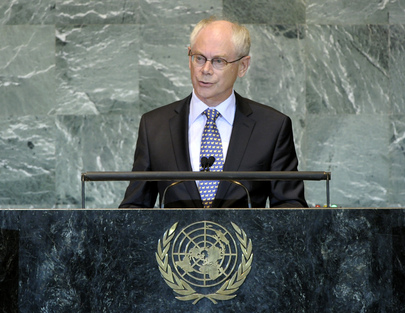
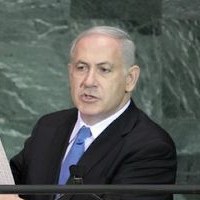
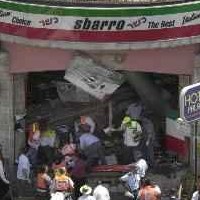
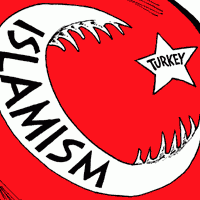
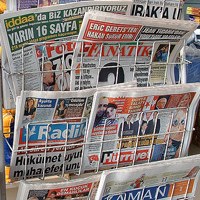
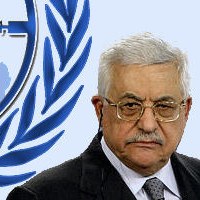




President Van Rompuy Addresses the General Debate of the 66th Session of the General Assembly | Midd http://t.co/Wc5yXwIQ
President Van Rompuy Addresses the General Debate of the 66th Session of the General Assembly | Midd http://t.co/Wc5yXwIQ